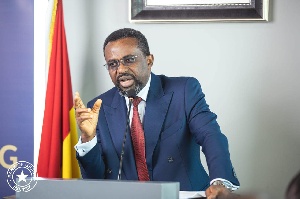- Home - News
- Elections 2024
- News Archive
- Crime & Punishment
- Politics
- Regional
- Editorial
- Health
- Ghanaians Abroad
- Tabloid
- Africa
- Religion
- Photo Archives
- Press Release
General News of Friday, 23 May 2025
Source: www.ghanawebbers.com
Governor explains economic gains
The Governor of the Bank of Ghana, Dr. Johnson Pandit Asiama, spoke about macroeconomic stabilization. He noted that recent policy actions by the central bank contributed to this improvement. Additionally, external and domestic factors played a role.
Dr. Asiama highlighted that inflation fell to 21.2 percent last month. This decline resulted from monetary tightening, stable exchange rates, and lower non-food inflation.
In March, the Monetary Policy Committee raised the policy rate by 100 basis points to 28 percent. Preliminary evidence shows this action helped reduce inflation momentum. The cedi appreciated nearly 19 percent between April and May, easing imported inflation pressures.
The Governor emphasized that the cedi's appreciation was due to prudent monetary policy and improved market sentiment.
Dr. Asiama made these remarks at the opening of the 124th Monetary Policy Committee meeting in Accra yesterday. The meeting included mandated MPC members and four advisors appointed by the central bank.
Participants included Joseph Obeng from GUTA and three advisors: Dr. John Kwakye from IEA, Professor John Gatsi from UCC Business School, and Dr. Francis Kumah, a former IMF representative.
The MPC meeting aimed to assess past monetary policy outcomes and their market impact. Members would evaluate whether exchange rate appreciation is sustainable and its implications for medium-term inflation forecasts.
Dr. Asiama noted encouraging signs of macroeconomic progress that must be sustained. Ghana reached a staff-level agreement with the IMF on its Extended Credit Facility program.
He acknowledged some outstanding prior actions under key performance indicators but remained optimistic about progress.
Additionally, S&P Global Ratings upgraded Ghana’s sovereign rating from selective default to CCC+. This upgrade reflects improvements in managing the economy.
Dr. Asiama mentioned strengthened external reserves and an improved trade balance as positive signs. Consumer and business confidence indices are also rising steadily; however, challenges remain.
Despite stabilizing conditions, he warned that risks persist both globally and domestically. The MPC must make significant decisions to consolidate gains made so far.
He praised the current MPC format for enhancing focus on key policy issues through internal advisors and external members.
However, more work is needed despite recent gains in macroeconomic conditions. While inflation outlooks are improving, vulnerabilities remain due to food supply constraints and external price shocks.
Geopolitical tensions could also affect commodity prices and financial flows in emerging markets like Ghana’s.
To address these issues, Dr. Asiama announced a comprehensive review of monetary policy implementation frameworks at the central bank. This review aims to shift reliance from unremunerated cash reserve ratios to active open market operations using longer-tenor BoG instruments.
The goal is to enhance policy transmission while improving liquidity management for private sector credit expansion.
As deliberations begin, he urged careful assessment of whether current policies can drive disinflation without harming fragile growth momentum.
Finally, he stressed that MPC credibility relies on responding effectively to changing economic realities.
In context, data showed that the Ghana cedi continued appreciating against major currencies into mid-May 2023. It strengthened significantly since March this year against both the dollar and other currencies like sterling and euro.











